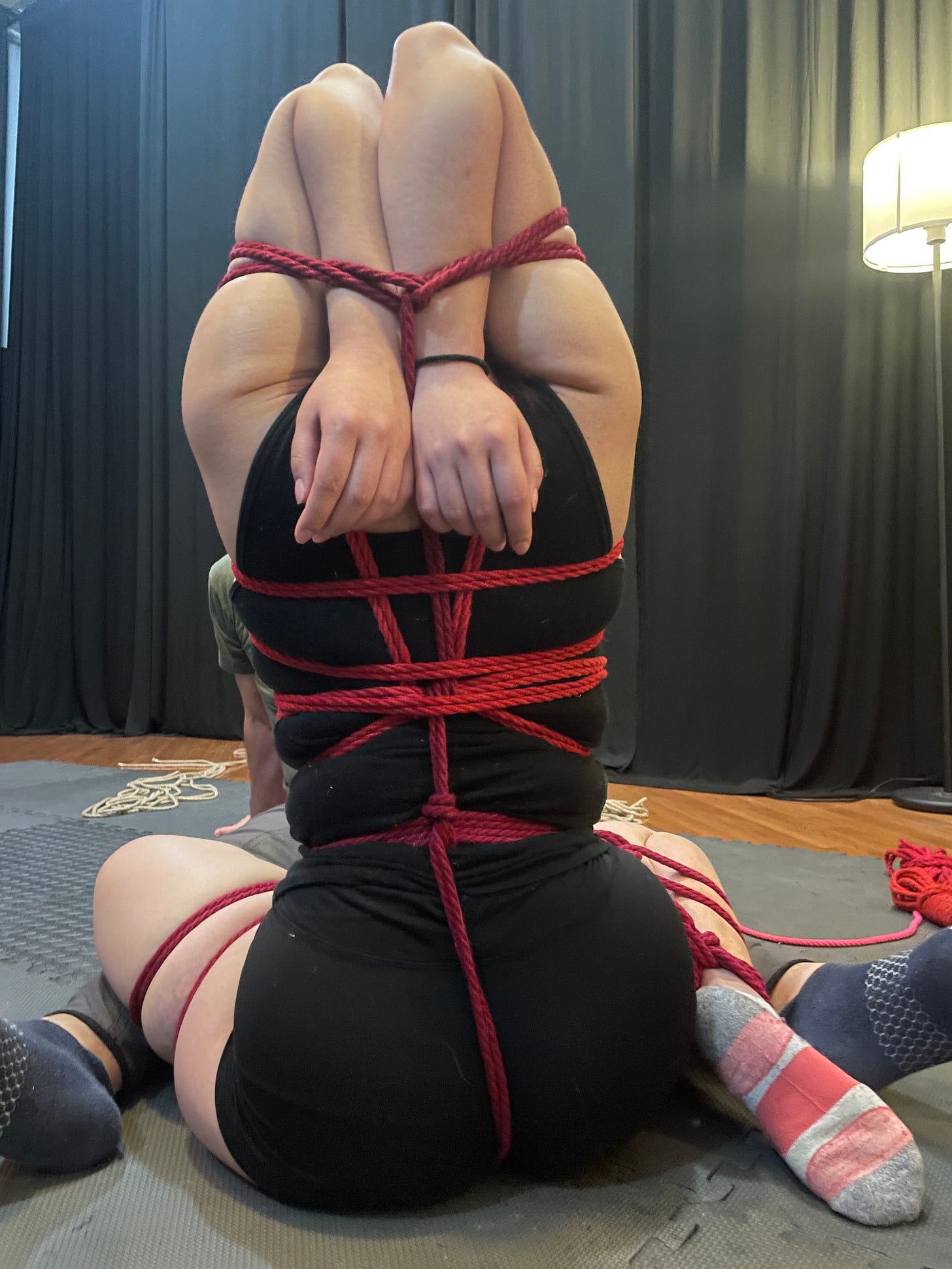Rebuilding Columbia’s Premier BDSM Club
The student group is back, and its mission goes beyond more than just rope.
The first meeting of the newly refounded Columbia BDSM club took place in a Five Guys.
Nervously seated around a table, with a pile of fries in front of us, we went around and shared our names, pronouns, and kinks. The absurdity was palpable, but that didn’t stop the group’s leaders from talking about their leanings in great detail, throwing around terms like sadomasochism with the same ease that other Columbia students might discuss their favorite TV shows. One member casually mentioned she had been to kink parties on both Saturday and Sunday nights—then made it to her 10:00 a.m. lecture on Monday morning without missing a beat.
That surreal Five Guys gathering was my first introduction to Conversio Virium (CV), (Latin for “exchange of power”) Columbia and Barnard’s joint BDSM club. BDSM—an acronym for bondage and discipline, dominance and submission, sadism and masochism—is nothing new at Columbia. The original rendition of CV was founded in 1994. The club garnered widespread popularity and attention in the mid-to-late 1990s, becoming an iconic fixture in the Columbia community. Officially obtaining official recognition by the University, CV quickly established itself as a well-known presence on campus, hosting open meetings, tabling at club fairs, and educating students about the hobby.
Unfortunately yet unsurprisingly, CV experienced its fair share of controversy from critics both inside and outside the University. Immediately after the group’s founding in 1994, a Christian group on campus convinced Columbia to shut down CV, citing its promotion of “unjustifiable violence.” After intense backlash from the Columbia community and the National Writers Union, the University decided to roll back its decision to suspend CV as a legitimate campus organization.
This incident marked the beginning of a long path of controversy. In 2006, conservative media pundit Ann Coulter weighed in on Fox News, calling CV “the biggest losers who need to join a club to have sex,” before proceeding to bash the group on primetime news. In her critique, Coulter argued that CV represented “just a more coarse version of what liberals are doing all the time, which is coarsening the culture and trying to make all of us like, you know, one step above the heifers.” This sparked nationwide headlines and thrust CV into the public eye as a prime example of backwards and radical leftism in higher education.
Contrary to what Coulter claims, CV was and is not a sex club. Her misguided judgment reinforces a prominent misconception about CV: that BDSM is purely sexual. As Cherry BC ’25 (who requested to go by her “scene name”—a pseudonym used in kink communities to create a separate identity within the space), president of CV, told Sundial, “BDSM is not technically considered sexual.” Cherry added that the hobby is often focused on power dynamics between individuals, not sexual gratification.
While it’s true that some practitioners incorporate BDSM elements into their sex lives, the core of the hobby is rooted in trust, boundaries, and control. “This is NOT a place to find people to fuck! BDSM ≠ sex!” Cherry wrote in an introductory email to club members this year. Views within the kink community vary, but the assumption that BDSM is innately sexual remains a driving force behind its public stigma.
These misconceptions are directly tied to the club’s goals of “community and education.” Because BDSM is such a widely divisive subject, the practitioner community has become incredibly tight-knit. As a result, even finding basic information about how to get started or practice BDSM safely can be difficult. For example, sadomasochistic play—the act of giving or receiving pain—involves impact on the lower back and has been shown to cause kidney injury. There are also psychological risks, such as panic attacks and dissociation, which require careful negotiation and trust to avoid. Practices like establishing safe words are essential for maintaining consent and emotional safety. Without proper knowledge, newcomers risk engaging in practices that are both physically and mentally harmful.

This is the gap CV hopes to bridge, providing a space where students can learn about the hobby in an informed and inclusive environment. “It's just important to have a community, and it's also important to have a group of people who can properly educate about it,” Cherry said, ensuring that those interested have both a support system and access to accurate, responsible guidance.
In the future, the group aims to expand its reach and impact through workshops on sexual safety, consent, and communication. These conversations are relevant to anyone, whether or not they have an interest in BDSM. The communication practices foundational to kink—negotiating boundaries, establishing trust, and ensuring ongoing consent—can also serve as valuable tools in a variety of intimate and interpersonal contexts. By fostering discussions around boundaries, enthusiastic consent, and emotional well-being, CV hopes to foster a culture of respect and self-awareness that goes well beyond BDSM itself.
The original iteration of CV went on hiatus in 2018 and was briefly revived in 2023 before falling defunct again. An Instagram account with the handle @conversiovirium was all that survived of the club. Now, Cherry has picked up the torch, and this second revival is more than just a passion project.
“One of the reasons why I wanted to be a Barnard student was because I wanted to be in CV,” Cherry says. Cherry tried to learn as much as she could about CV before coming to Barnard. She searched Instagram, online forums, and past articles about the group, trying to find an email list signup or website, but her search was unsuccessful. After arriving at Columbia and realizing that there was no club, she took it upon herself to restart it.
Cherry’s passion for the hobby and willingness to revive CV reflect something larger: the inclusivity of the BDSM community at large. Columbia and Barnard, with their prime location in New York City, are notoriously bad at cultivating a sense of belonging among students. Many American colleges foster a built-in sense of community simply from being located in isolated college towns. Unfortunately, Columbia suffers from the opposite effect. Undergraduate students are not met with a warm sense of kinship, but instead are hit with the realization that being located in such a massive city has diluted any sense of community at Columbia.
For Cherry, BDSM and CV have come to serve as her main community as a Barnard student. While other freshmen flock to traditional clubs, sports, or Amity Hall Uptown to find friends, she found her people differently. In many ways, the NYC kink community’s “accepting and welcoming” nature, she said, has given her a sense of belonging that Columbia itself often struggles to provide.
This newest iteration of CV, just like its predecessors, has had its fair share of challenges since its rebirth. Low meeting attendance and troll responses mocking the group have steepened their path to formal recognition by Columbia. Gaining recognized status would give CV visibility and streamline the event planning process, a step in the right direction of restoring the group as a legitimate campus organization, Cherry said.
Despite all of this, Cherry simply says to “Bring your questions, bring a good vibe. There will be no judgment.”
CV is not for everyone, and it wasn’t designed to be. The vast majority of Columbia students will go their entire time on campus without ever knowing it as anything beyond “that BDSM club,” but that isn’t necessarily a bad thing. Just like the ultra-selective finance clubs, CV means a great deal to a small group of students and hardly anything to the rest.
Conversio Virium may not be the most popular club on campus, but for those who seek it out, it provides not just education and camaraderie, but a rare sense of belonging in a place where that is anything but a given. Whatever one may think about CV, it remains undeniable that such a unique club is able to bind its members together with more than just rope.
Mr. Maretzki is a staff editor for Sundial and a first-year studying data science at Columbia College.




Considering Columbia’s relation to the Trump administration, the whole University should consider itself a member of CV.
How do I find more info?